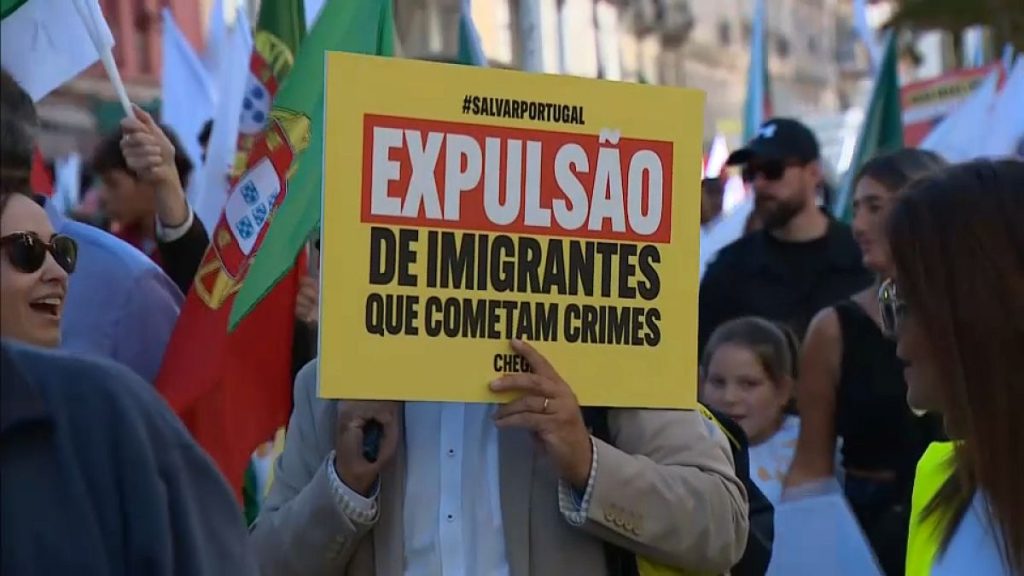Thousands of people in Portugal gathered for a protest against ‘uncontrolled immigration’ in a rally organized by the far-right CHEGA party. Demonstrators marched through the capital Lisbon carrying Portuguese flags and banners advocating for the expulsion of immigrants who commit crimes. The protest highlighted concerns about the impact of immigration on the country, with some participants expressing feelings of insecurity that they attribute to the presence of foreigners. CHEGA party leader André Ventura emphasized the importance of legal immigration and the need to consider the social welfare implications of welcoming a large number of immigrants.
Ventura emphasized that immigration cannot be solely viewed from a social welfare perspective, as it also contributes to issues such as the housing crisis in the country. He argued that an influx of 15% of foreigners would strain the housing supply in Portugal, leading to a shortage of homes for residents. Lawmaker Rui Afonso echoed these concerns, stating that European countries, including Portugal, struggle to manage the flow of immigrants effectively, resulting in challenges such as homelessness and crime among some immigrant populations. This sentiment sparked tensions during the protest, particularly in neighborhoods with large immigrant communities, where some protesters clashed with pro-immigration activists advocating for a more inclusive approach to immigration.
The rally against uncontrolled immigration comes amid a significant increase in the number of foreigners living in Portugal, which rose by over 33% last year, reaching more than one million individuals, representing around one-tenth of the total population. This surge in foreign residents has prompted the Portuguese government to tighten its migration policy, reflecting the growing concerns about the impact of immigration on various social issues, including housing and crime. The removal of a measure allowing undocumented immigrants to regularize their status after one year of work is part of the government’s efforts to manage immigration more rigorously.
The protest against uncontrolled immigration in Portugal has underscored the complex debates surrounding immigration policies and their implications for society. While some argue for stricter controls to manage the flow of immigrants and address social issues such as housing shortages and crime, others advocate for a more inclusive approach that welcomes immigrants and values their contributions to the country. The tensions between these perspectives were evident during the demonstration, with clashes between protesters and pro-immigration activists reflecting the deeply divided views on the issue. Moving forward, Portugal will need to navigate these competing narratives to develop a balanced and sustainable immigration policy that addresses the concerns of both proponents and opponents of uncontrolled immigration.
Despite the polarizing nature of the protest against uncontrolled immigration in Portugal, the demonstration has brought to light critical issues that the country must address to ensure the well-being of its residents and immigrants. By highlighting the challenges associated with rapid demographic changes and the strain on social services, the protest has sparked a national conversation about the need for a comprehensive and thoughtful approach to immigration policy. The Portuguese government’s recent efforts to tighten migration regulations indicate a shift towards a more restrictive stance on immigration, signaling a response to the concerns raised by protesters and other stakeholders. Moving forward, continued dialogue and engagement with different perspectives on immigration will be essential to develop policies that balance the country’s economic needs with its social and security concerns.
The protest against uncontrolled immigration in Portugal has revealed the complex interplay of social, economic, and political factors shaping the country’s approach to immigration. As protesters call for stricter controls and the expulsion of immigrants who commit crimes, others advocate for a more inclusive and welcoming approach that recognizes the contributions of immigrants to society. The tensions between these contrasting views reflect broader debates within Europe and around the world on how to balance concerns about security, social welfare, and cultural diversity in the context of globalization and increasing migration. Ultimately, Portugal’s response to these challenges will determine its ability to effectively manage immigration while upholding its values of inclusivity, respect, and social harmony.













